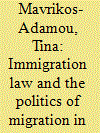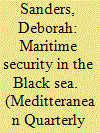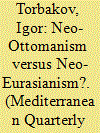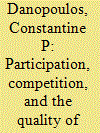|
|
|
Sort Order |
|
|
|
Items / Page
|
|
|
|
|
|
|
| Srl | Item |
| 1 |
ID:
154893


|
|
|
|
|
| Summary/Abstract |
The European Union should consider Turkey a core actor for implementing the Southern Energy Corridor that will serve Europe’s main energy security strategy: diversification of routes and suppliers of energy. At the same time, the EU should pay attention not only to Ankara’s sensitive bilateral relations with the countries along the corridor but also with others that can influence the operation of this corridor, mainly Russia. The quality of relations among Turkey, Azerbaijan, Georgia, Greece, Russia, and the EU should be considered of fundamental importance for the implementation of such a project. An analysis of these relations sheds light on policymakers’ options.
|
|
|
|
|
|
|
|
|
|
|
|
|
|
|
|
| 2 |
ID:
154892


|
|
|
|
|
| Summary/Abstract |
This essay first examines how Lebanese Hezbollah’s wars have changed the content and saliency of its several identities. It then focuses on the role of these identities on the group’s moral conception of using force. The analysis includes Hezbollah’s conflicts against Israel and its more recent military involvement in the Syrian conflict. The essay argues that Hezbollah exhibits five different identities: Islamic, Shiite, Lebanese, Arab, and resistance. Each has played a significant role in the group’s legitimizing of its war decisions, which in turn has provided Hezbollah the grounds to remain an armed non-state actor in the Middle East.
|
|
|
|
|
|
|
|
|
|
|
|
|
|
|
|
| 3 |
ID:
154890


|
|
|
|
|
| Summary/Abstract |
There remains a void between the legal framework of immigration in Greece and its implementation. The essay explores this theme, first by providing an overview of Greek legislative acts and immigration laws from 1991 to 2015. This discussion is then placed within the Greek political arena by focusing on three political parties in Greece that have espoused anti-immigrant rhetoric. The essay concludes with suggestions of ways in which reconciliation can occur between Greek immigration law and the political environment
|
|
|
|
|
|
|
|
|
|
|
|
|
|
|
|
| 4 |
ID:
154889


|
|
|
|
|
| Summary/Abstract |
Traditional maritime security challenges have returned to the Black Sea, and this has had a negative effect on the ability of the six littoral states to address newer security challenges. Traditional maritime security challenges include the buildup of Russian forces in Crimea, the return of conflict to the shores of the Black Sea, uncertainty over the demarcation of maritime borders, and strained relations between Turkey and Russia. As a result, newer and no less important maritime security challenges have, in effect, been pushed off the agenda.
|
|
|
|
|
|
|
|
|
|
|
|
|
|
|
|
| 5 |
ID:
154894


|
|
|
|
|
| Summary/Abstract |
This essay investigates the ideational aspect of contemporary Turkey’s identity politics and international conduct and compares these to Russia’s. Over the past decade, several analysts have speculated that Russia and Turkey could form a strategic axis based on the shared vision of “Eurasia” and that there is similarity between Moscow’s and Ankara’s strategic outlooks: Russian neo-Eurasianism and Turkey’s Kemalist Eurasianism. Yet the outlook that defines Ankara’s understanding of Turkish national interest is not so much a permutation of Eurasianist ideas as it is a homegrown postimperial (and post-Kemalist) strategic vision, also known as neo-Ottomanism. Despite their philosophical affinity, neo-Eurasianism and neo-Ottomanism contain significant potential for confrontation.
|
|
|
|
|
|
|
|
|
|
|
|
|
|
|
|
| 6 |
ID:
154891


|
|
|
|
|
| Summary/Abstract |
This essay assesses participation and competition in the quality of democracy in Greece. Theoretically, the quality of democracy is assessed in three interrelated dimensions: procedure, result, and content. Procedure encompasses the character and working of the environment in which governance takes place, and it is assessed through the rule of law, accountability, and participation and competition. Result refers to the overall quality of government performance and citizen satisfaction. Content involves the quality of the substance of governance. Using diverse indices and quantitative data, the essay assesses the participation and competition dimensions of the quality of democracy in post-1974 Greece. It concludes that the country’s quality of democracy is fair but in need of improvement.
|
|
|
|
|
|
|
|
|
|
|
|
|
|
|
|
|
|
|
|
|